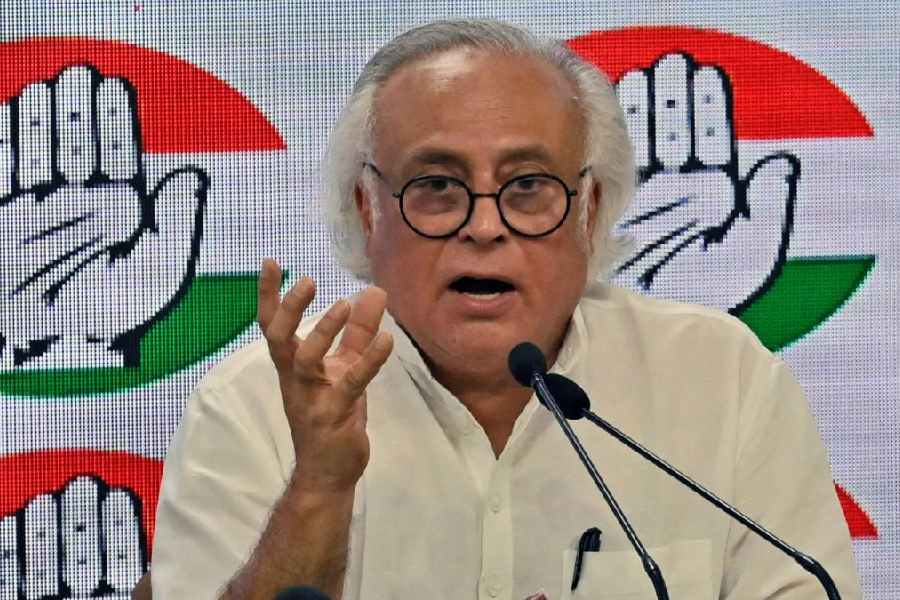The Congress on Sunday said that Prime Minister Narendra Modi’s announcement about the free ration scheme for the poor being extended by five years signified continuing economic distress amid claims of "Amrit Kaal".
While the Congress didn’t criticise the decision, it saw the Prime Minister’s compulsion to extend the scheme, which benefits 80 crore people, as a realistic assessment of the ground reality.
“This means the economic distress continues and disparities are rising because of Modi’s policies. It shows people can’t purchase even essential commodities because of soaring prices and falling incomes,” Congress communications chief Jairam Ramesh said.
“Modi as chief minister of Gujarat opposed the food security act passed by the Manmohan Singh government. Now the same scheme has been rebranded to help the people who suffered income losses during the Covid lockdown,” Ramesh said at a news conference in Bhopal.
“The economic distress started with the note-bandi. Modi, who is on a Desh Becho Abhiyan (Sell-the-Nation Mission) to one friend, had also made fun of the MGNREGA (rural job guarantee scheme), which came to people’s rescue in a time of acute distress.”
Somewhat surprisingly, Modi, who tends to claim dramatic improvements on his watch and harp on India becoming the third-largest economy during an “Amrit Kaal”, appeared to attribute his decision to wretched poverty.
Addressing a rally in poll-bound Madhya Pradesh on Saturday, Modi said: “We gave free rations to 80 crore people under the Garib Kalyan Anna Yojana…. Unka chulha kabhi bujha nahin. Maa ko kabhi rote-bilakhte bacche dekhne nahin pade (The fire in their stove never went out; the mother never had to see her children crying).”
The imagery used by the Prime Minister was clearly not in sync with the lofty rhetoric of India becoming a “Vishwaguru” (teacher of the world) and achieving “Amrit Kaal”.
Modi, however, drove the message home: “I have lived in poverty. I experienced the pain of the poor. I have made up my mind. The scheme that was supposed to end in December will be extended for another five years. The central government will spend lakhs of crores on this scheme.”
While many Congress leaders privately wondered whether this decision would give the BJP an advantage in next year’s general election, others argued that the Congress’s robust welfare agenda had forced Modi to abandon his dislike for what he had so contemptuously dismissed as “rewdi culture”.
Modi had invoked the “rewdi” — a cheap sweet — to disparage the freebies that political rivals offered to voters during elections, arguing such sops did little apart from harming the economy.
As if on cue, the mainstream media was quick to accuse the Opposition parties of destroying India’s economy for their own political survival. Even the Election Commission of India got into the act and spoke of getting political parties to detail how their pre-poll promises could be financed.
Commenting on the welfare guarantees the Congress had offered to Karnataka before winning the polls there, Modi had warned of disastrous consequences in future. But the BJP soon chose to traverse the same path.
While the Shivraj Singh Chouhan government in Madhya Pradesh launched the Ladli Behna Yojana — a monthly cash assistance for women that is being seen as a lifeline for the BJP in the Assembly election — it also announced that it would refill cooking gas cylinders for Rs 450.
This is a bizarre spectacle of BJP-ruled states promising to subsidise cooking gas cylinders against Modi’s reformist choice of selling them for Rs 1,100 — now reduced to Rs 900 ahead of elections.
The BJP’s Chhattisgarh manifesto seems to have unwittingly punched holes into Modi’s “rewdi culture” argument.
Apart from offering multiple other sops, it promises Rs 3,100 for paddy per quintal, health insurance of up to Rs 10 lakh, Rs 12,000 a year for married women, and cooking gas cylinders for Rs 500. Ironically, these promises have been described as “Modi’s guarantees”.
Ramesh commented on the manifesto, saying: “The Prime Minister doesn’t speak this word, “rewdi”, these days. Rewdis are raining in Chhattisgarh. But anybody can make promises; our track record shows we have fulfilled our guarantees.”
He underlined that Modi had also been compelled to review the new pension scheme after the Congress implemented the old pension scheme responding to the demands of government employees.
The Congress had loudly attacked the government’s stance that there was no money to sustain the old pension scheme. Priyanka Gandhi Vadra had repeatedly said that Modi had splurged on G20 events, built a conference hall for Rs 26,000 crore, and spent Rs 20,000 crore on the new Parliament building and Rs 8,000 crore each on two new aircraft.
Priyanka also alleged that farmers were earning Rs 27 a day while Modi’s capitalist friend Adani had earned Rs 1,600 crore a day during Covid.
Ramesh too complained that while basic assistance to the poor was being ridiculed as “rewdi”, ports, airports, railways and PSUs were being handed over to Adani.
When the price of LPG cylinders was reduced by Rs 200, Ramesh said “demo-kursi”, not democracy, had forced the step.
Congress president Mallikarjun Kharge had sarcastically said: “Jab vote lage ghatne, toh chunavi tohfe lage batne (When the votes started disappearing, electoral gifts started pouring in).”
Modi had withdrawn the new farm laws under pressure. Now he has eaten his own words on “rewdi culture” by trying to match the Congress in offering freebies.












